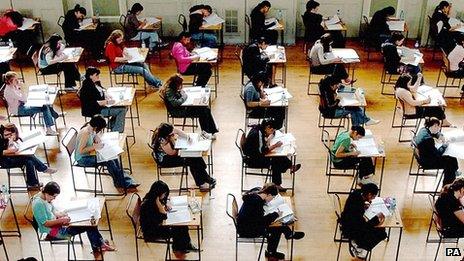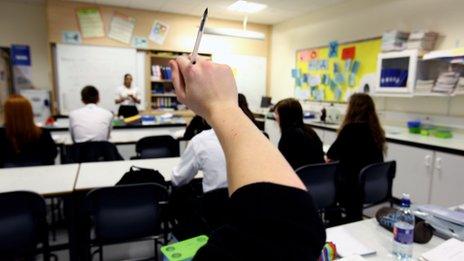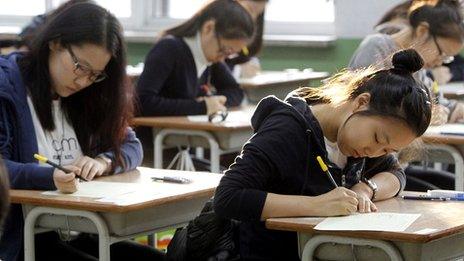OECD: Welsh government lacks education 'long-term vision'
- Published
The report praised "positive" learning conditions but found many weaknesses
A major review of the schools system says the Welsh government lacks a long-term vision for education and does not do enough to support teachers.
The Welsh government asked the worldwide Organisation for Economic Co-operation and Development (OECD), external to conduct the review in 2012.
The report praised "positive" learning conditions but found many weaknesses.
The most recent Pisa international education tests, which are run by the OECD, ranked Wales bottom in the UK.
Those 2012 Pisa tests in science, maths, and reading, external were taken by 500,000 15-year-olds in 68 countries.
The OECD review said: "From an international perspective, the performance of 15-year-olds in Wales on Pisa is low overall, and there are too many students performing at low levels.
"The Pisa 2012 reading and science assessments showed that almost one in five Welsh students did not achieve level two which is considered the baseline of proficiency at which students begin to demonstrate competencies to actively participate in life.
"For mathematics this proportion was even higher, almost 30%. These levels are among the lowest in OECD countries."
But the report said that schools in Wales offered positive learning environments with good teacher-student relations and classrooms conducive to learning.
It also praised Welsh schools for minimising the gender difference in student performance.
Following disappointing Pisa tests in 2009 the Welsh government embarked on a series of changes to raise standards and performance.
Several reforms followed including the introduction of the national literacy and numeracy framework, external for five to 14-year-olds in September 2012, which a year later became a statutory part of the national curriculum.
Statutory reading and numeracy tests for pupils in years two to nine were introduced last May.
Pace of reform
But according to the report the Welsh government had tried to do too much too soon.
It said: "The pace of reform has been high and lacks a long-term vision, an adequate school improvement infrastructure and a clear implementation strategy all stakeholders share."
Huw Lewis said it was a step-by-step process and he wanted to achieve 'excellence in an international setting'
One of the most controversial reforms by the Welsh government is school banding, introduced in 2011.
Teaching unions have argued it does not reflect what is happening in schools and that the requirements change from year to year.
The report largely agreed with that, but added the Welsh government should consider making the school banding calculation method more transparent.
The report also criticised the standards of teachers in Wales, and the lack of options for career progression and professional development for teachers and head teachers.
But it said schools in Wales found it difficult to recruit high-calibre teachers, which may be a result of the standard of applicants on teacher training courses.
Successive Welsh education ministers have made attempts to place more emphasis on tackling the link between poverty and low educational achievements.
The OECD said stability and a "long-term path" was required
There are several schemes which aim to raise the attainment of pupils from the poorest families, such as the pupil deprivation grant, but the report claimed the system was too complex.
Responding to the findings, Education Minister Huw Lewis told BBC Radio Wales a reform programme was already "tackling" and "grappling" with the issues.
"We also need to think about the medium and the long term and that's why later on this spring, for instance, I will be making further announcements around our support programme concerning training for teachers," he said.
"I'm very concerned that we have the proper support network around the professionals that are delivering at the sharp end and I want to make sure they're getting everything that they need."
'Knee-jerk'
The minister will attend this week's OECD's education policy committee meeting in Paris to discuss the report's findings.
The National Union of Teachers in Wales said the sector has to be given better support in delivering new initiatives and that they must be less "knee-jerk in their formation".
The ATL Cymru union said the report should make uneasy reading for ministers but Dr Christopher Howard, of NAHT Cymru, said it was one of the most "honest, objective, rounded and helpful reports" in the last few years.
The Conservatives called it "yet another scathing report" while Plaid Cymru accused the Welsh government of "blaming the education sector for failures when it hasn't given a clear indication of what the sector is setting out to achieve".
- Published10 April 2014

- Published18 February 2014

- Published10 December 2013

- Published4 December 2013

- Published3 December 2013

- Published3 December 2013
